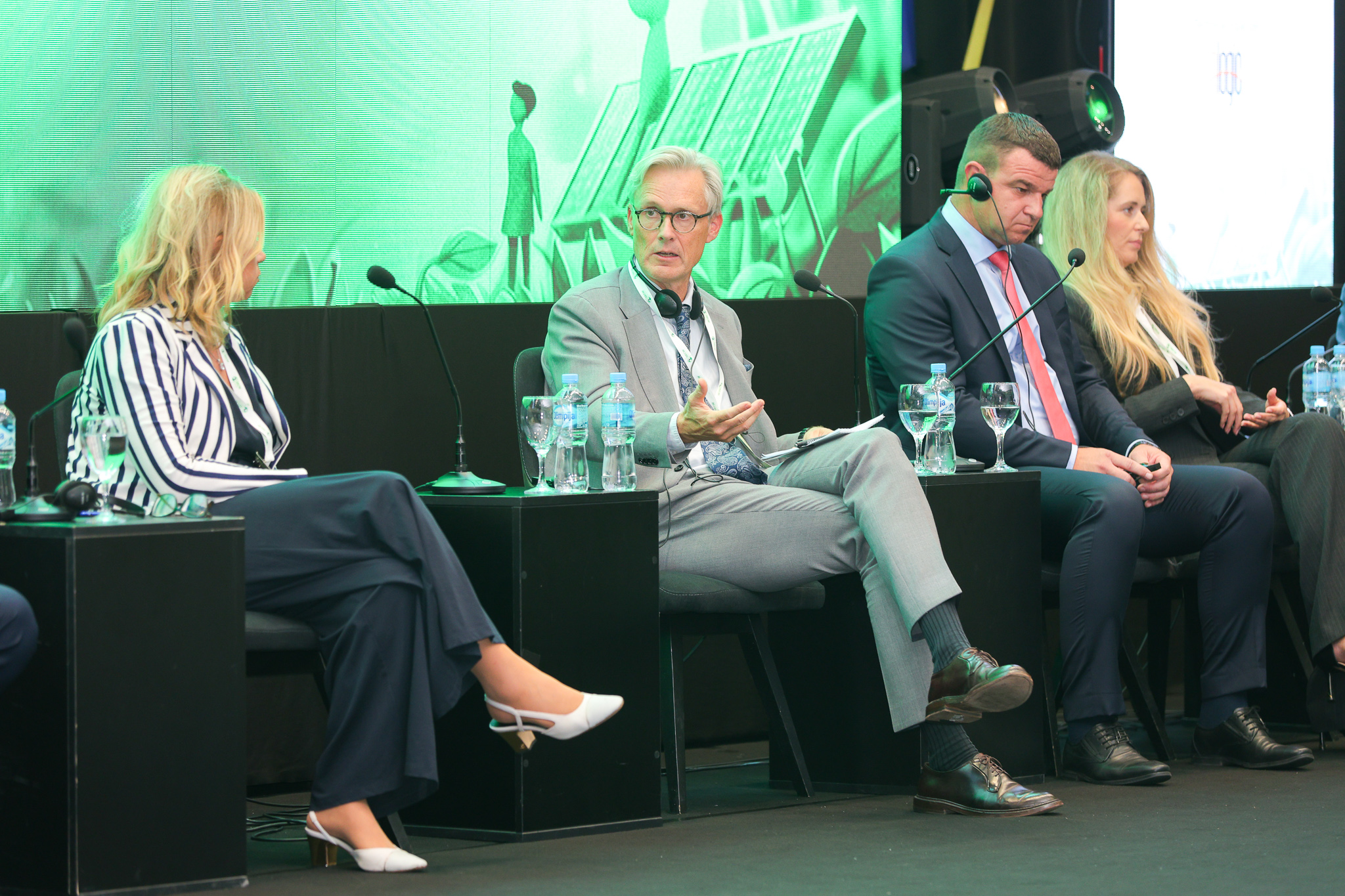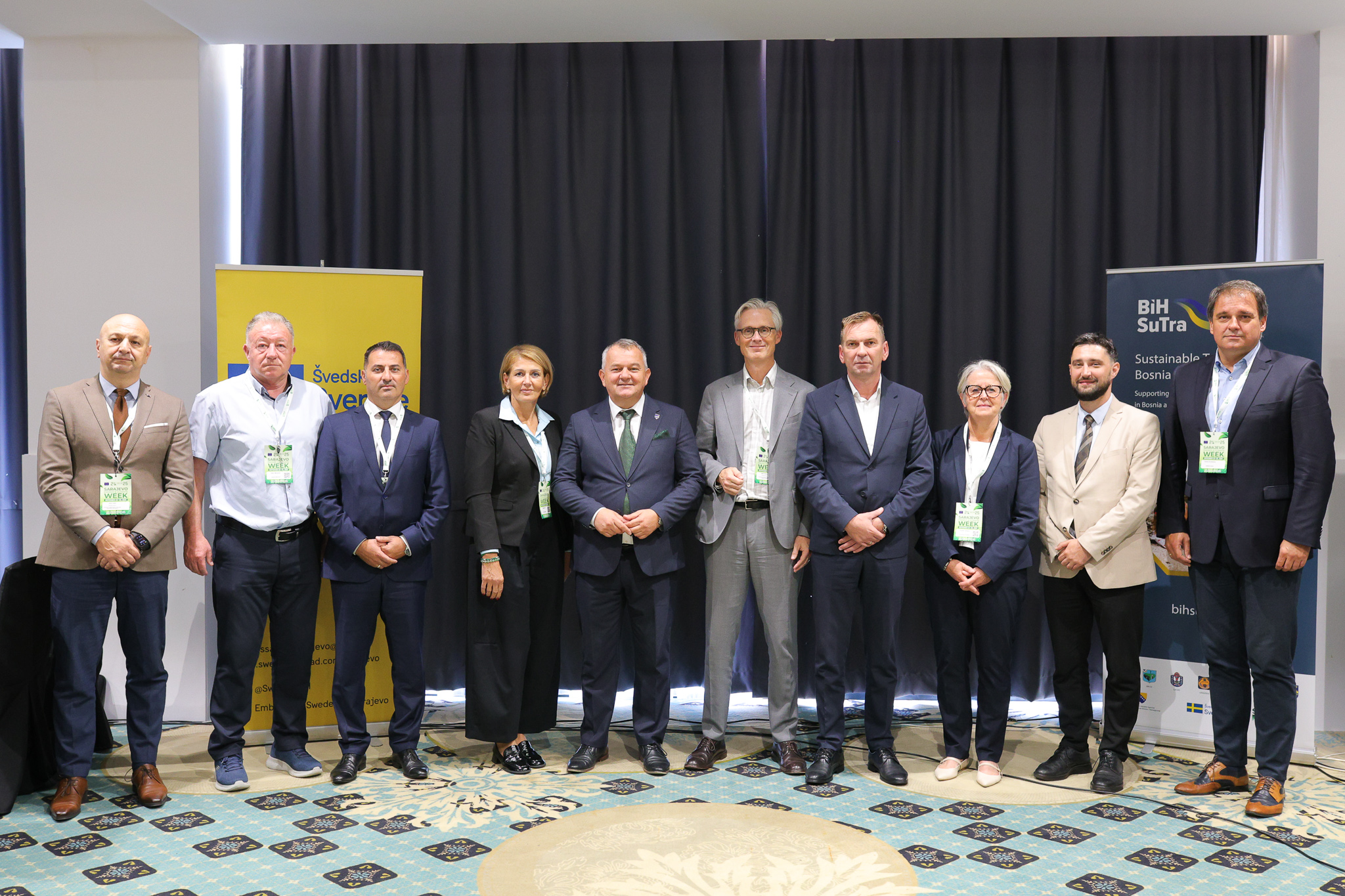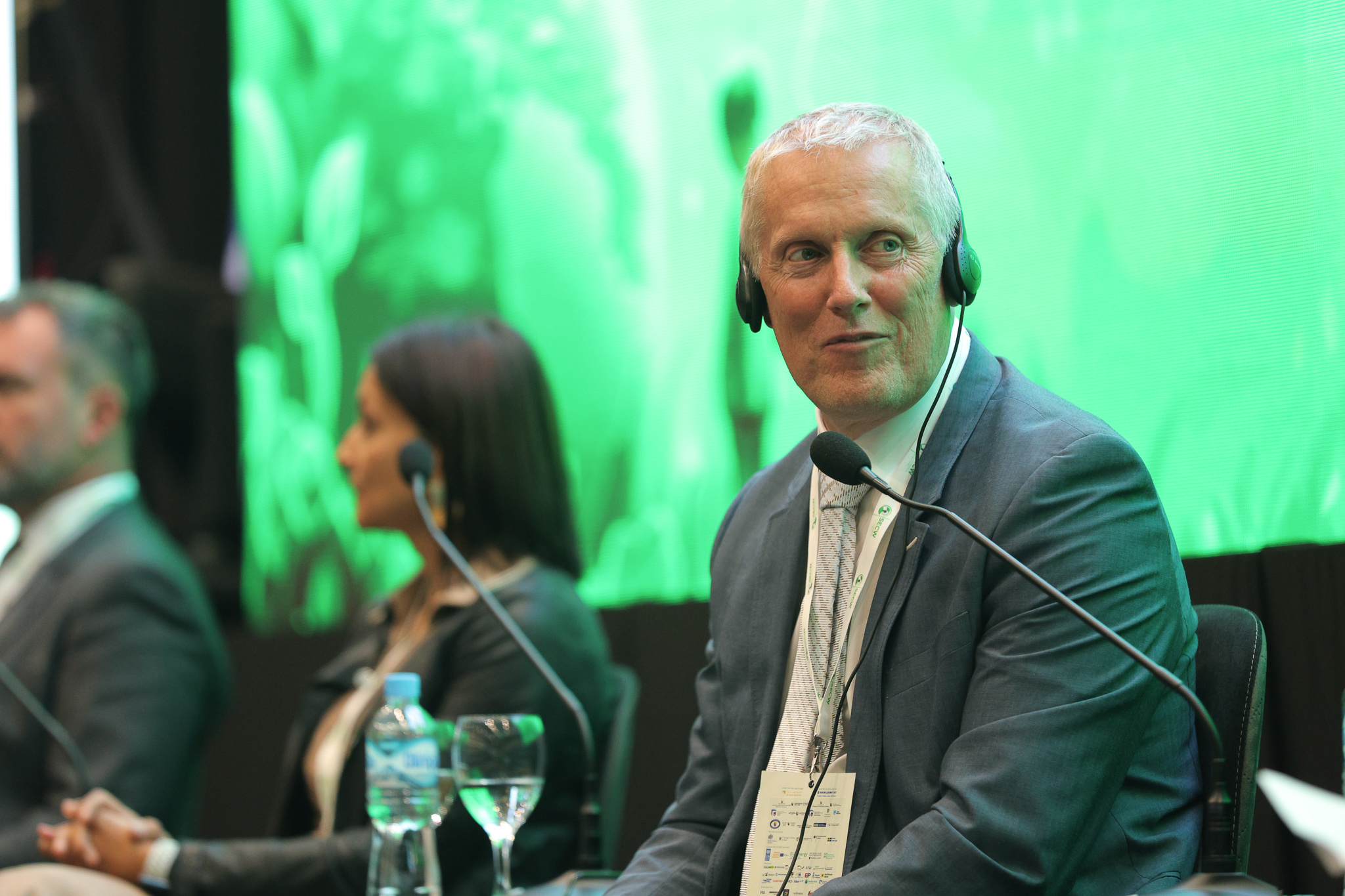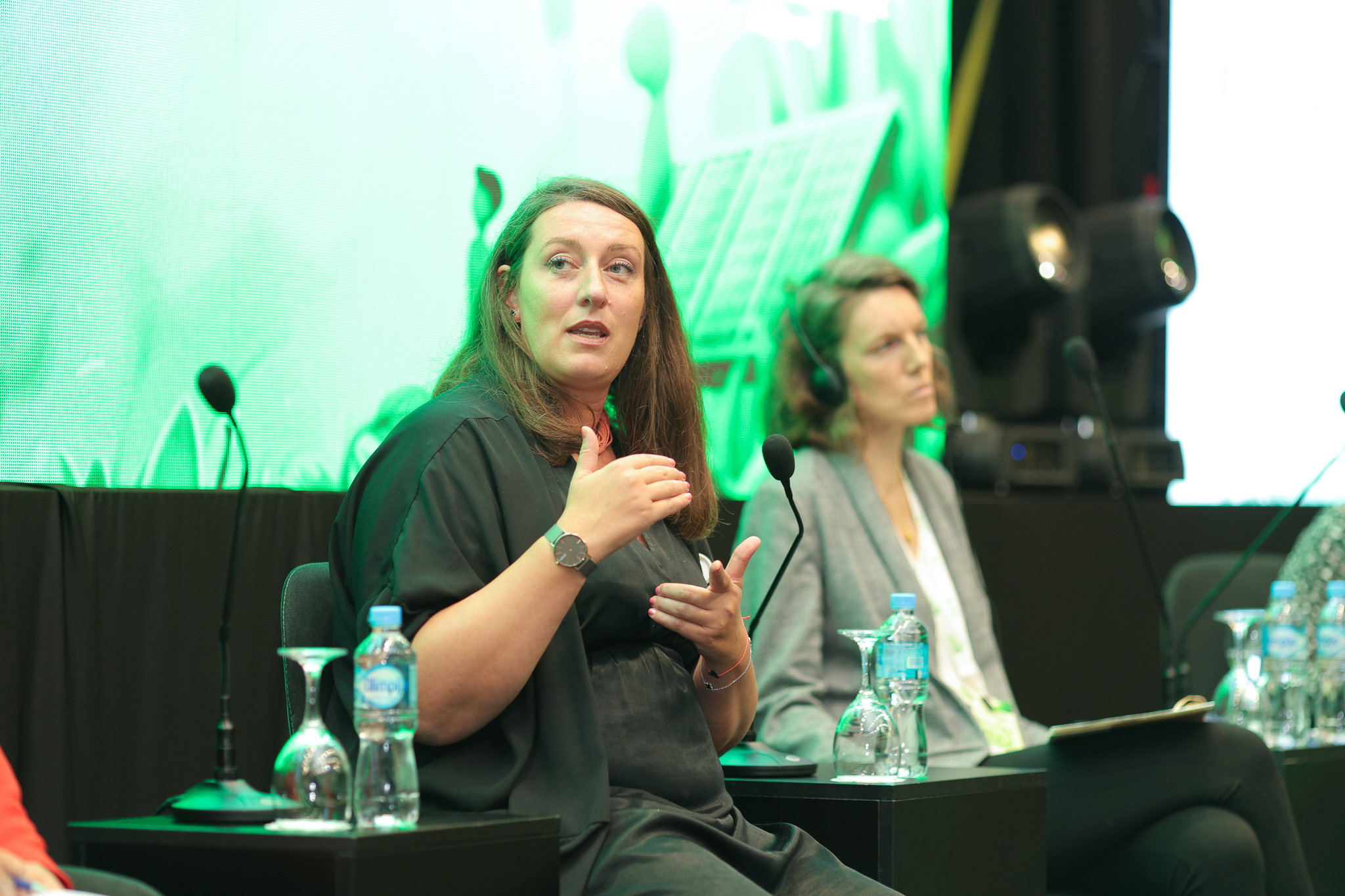 Participants signing the Memorandum of Understanding. Photo: Jasmin Agović.
Participants signing the Memorandum of Understanding. Photo: Jasmin Agović.
 Participants signing the Memorandum of Understanding. Photo: Jasmin Agović.
Participants signing the Memorandum of Understanding. Photo: Jasmin Agović.
In turbulent times with escalating climate change impacts and pressing energy challenges, the third Sarajevo Energy and Climate Week (SECW) brought together key stakeholders from across the energy and climate sectors in Bosnia and Herzegovina and the Western Balkans to showcase sustainable policies and practices. SEI and BiH SuTra representatives took part.
As part of the conference programme, the BiH SuTra project used the opportunity to raise important questions and provide science-based solutions in several panel discussions. During the first day of conference, SEI’s Executive Director, Måns Nilsson, participated in the panel titled “The Climate Challenge and the Future of the Power Sector in BiH”. The discussion focused on offering key insights on how the energy transition can become a reality in the region.
Sweden’s experience with carbon taxation — dating back to 1991 — offers powerful lessons for climate action and economic policy. The carbon tax was not just a climate measure; it was part of a broader tax reform. “The key was to design something simple and easy to implement, with exemptions that could be gradually phased out. Far from being a burden, this approach actually helped industry adapt – rapidly reducing fossil fuel use and accelerating the shift toward renewables,” Nilsson explained. It also helped lay the groundwork for Sweden’s Emissions Trading System (ETS), which has proven especially beneficial for the power sector. Companies could capture the carbon price premium, making the system economically viable — even advantageous. It was concluded that when done right, climate policy can drive innovation, investment, and economic growth.

A key highlight of SECW 2025 for the BiH SuTra project was the side event where we launched new partnerships for transition. During this event, we signed a Memorandum of Understanding (MoU) with new project partners, shared the latest progress and updates, and explored what are the next milestones in the project.
A MoU was signed with three additional local self-government units (LSGUs): the Municipality of Gacko, the City of Gradiška, and the Municipality of Kakanj. Through BiH SuTra, the participating municipalities are formalizing their commitment to designing and implementing effective, inclusive, and locally driven transition measures. The three new communities are joining the existing project partners – the Municipality of Banovići, the Municipality of Breza, the Municipality of Ugljevik, and the City of Živinice – which have already adopted transition plans and are taking concrete steps toward climate-neutral development.
Måns Nilsson gave a keynote at the side event. He emphasized how it is “fantastic to witness the readiness and motivation from local partners working on transition, such as on reducing pollution, finding ways to decarbonize, and improving health and quality of life for citizens across Bosnia and Herzegovina. At SEI, we are not only committed for the duration of this initiative — we aim to be a trusted, effective knowledge partner to the country for years to come.”
“We must be aware of that to unlock success in this assignment we need two elements: our international partners and their commitment as well as ourselves, the local community. I wish to thank all the individuals in this project that recognised we could become a partner even before we ourselves realised this was an opportunity.”
Mr. Vukota Govedarica, Mayor of Gacko Municipality
“I’m very honoured to be part of this new chapter ofGradiška. This event shows that communities like us in BiH can be carriers of a responsible and inclusive transformation.”
Mrs. Dragana Ilić, representative of City of Gradiška
“If there is any community interested in this type of project it is Kakanj, being one of the most polluted communities in BiH. We are in favour of the overall approach and very interested in finding new ways and new solutions, and we look forward to have our partners support us.”
Mr. Mirnes Bajtarević, Mayor of Kakanj Municipality
“The BiH SuTra has come into our community and is showing us the path to a better future, that is how I see it. It has been pleasant to participate in all project activities, because this project has a clear purpose and clear processes in place. We’re already seeing some results, and we will most certainly achieve further great outcomes moving forward.”
Adem Mostarlić, representative of Banovići Municipality
“It has been a breakthrough to work in this project which is giving us particular strength and motivation. We have adopted a transition plan and we’re already working on a few measures as part of that plan. And I’m certain that our city can be used an example of how to fast track transition.”
Mr. Began Muhić, Mayor of City of Zivinice
“Breza is a mining community and closing the mine has been resented among the people until BiH SuTra came and started the transition process. Thanks to the engagement with citizens they now understand better that transition and sustainability mean a better future at all levels of the local life, and not necessarily that standards of life would be reduced and jobs lost. Only this is a key result.”
Mr. Vedad Jusić, Mayor of Breza Municipality
“We fully support BiH SuTra and a sustainable transition. We are unfortunately a big polluter of the river Janja due to our sewage and wastewater, but we are now at concept design of new water treatment plants to improve the conditions of the river, as outlined in our transition plan developed together with the project.”
Mr. Dragan Gajić, Mayor of Ugljevik Municipality
As more local partners are joining the BiH SuTra project, it´s motivating for the project team to recieve positive feedback and perceive so much enthusiasm from the communities who want to improve their environment. “We have developed 4 concrete transition plans that we’re now supporting communities to implement, and we look forward to having more municipalities and cities on board. We have organized information and consultation campaigns in the project but we need to do even more; we need to ensure we discuss, we bring up conflicting opinions, and be able to collaborate and draw conclusions together; the industry, the power plants, the mines, the citizens,” said Saša Solujić, Project Manager of BiH SuTra.
BiH SuTra project demonstrates the importance of engaging with local communities, since they are on the front lines when it comes to climate impacts, and are also the ones that can mobilise people and drive change.

During the third day of SECW, BiH SuTra project experts took part in two more panels. On the panel “From Waste to Energy in the Transition to a Circular Economy,” Tomas Thernström from SEI emphasized that recycling must be simple if it is to succeed – yet making it simple often requires significant investment. He highlighted that successful recycling cannot rest on the shoulders of a single actor: municipalities, state institutions, producer responsibility organizations, utility companies, and property owners all share responsibility in making recycling accessible and appealing. Thernström underlined that close cooperation among all stakeholders is essential to drive an effective transition toward a circular economy.

At the panel “Just Transition in Coal-Rich Regions” Saša Solujić, Project Manager of BiH SuTra, presented a broader perspective on just transition, extending beyond mine closures and decarbonization to include water management, agriculture, nature protection, and biodiversity conservation. She stressed the importance of open dialogue with local communities, ensuring people have space to voice their concerns, hopes, and ideas. Agriculture emerged as a particularly dynamic topic, bringing people together and opening new opportunities. Solujić noted that including all relevant actors—especially young people—while keeping long-term community needs in focus fosters stronger support and deeper understanding of transition as an inclusive, collective process. Both panels demonstrated that cross-sectoral cooperation, local engagement, knowledge exchange, and international support are vital to building a fair and sustainable transition.

Looking beyond The Sarajevo Energy and Climate Week 2025, BiH SuTra is now boosted with more partners on board, all with a shared commitment to drive the transition forward. We are energized and ready to drive real, lasting change — for our communities, and for the planet. Let’s get to work!
Discover the News and Updates section, delivering the latest updates and insightful content across various topics. Stay informed with most recent news articles, reports, and publications, of the BiH SuTra project.